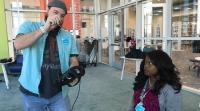My Life Experience Mobile Empathy Lab
Richland Library, S.C.
Innovation Synopsis
Richland Library’s My Life Experience Mobile Empathy Lab is one of the first of its kind in public libraries nationally. The lab uses virtual reality (VR) technology and simulation tools to cultivate empathy in our community. Since its debut in November 2018, the lab has addressed immigration, homelessness, living with impairments and racism.
Challenge/Opportunity
The news bombards us with daily doses of tragedy from police shootings and sexual violence to homelessness and rising racial tensions. Yet, studies reveal that we are 40% less empathetic than preceding generations. However, research has shown if you walk in someone else’s shoes, the experience creates understanding, and understanding fosters empathy. The library’s lab allows users an opportunity to “try on” someone’s life — thereby, creating meaningful dialogue and shifting perspectives in our community.
Key Elements of Innovation
The My Life Experience Mobile Empathy lab includes a total of eight Oculus Rift and HTC Vive VR headsets and uses specialized simulation tools (impairment gloves), which allow the user to be immersed in a more meaningful understanding of societal issues and build deeper community connections. Additionally, through the lab, the library has fostered partnerships with local service organizations to guide program content and create more cohesive experiences for users.
Achieved Outcomes
More than 300 people have participated in the library’s mobile empathy lab since its launch. Participants have commented on how realistic and emotional the experiences were. In fact, post-lab surveys show 96% of participants believe experiencing another person's situation through simulation tools could help deepen understanding of many societal issues, and nearly 80% of those surveyed believed they will feel or may act differently toward those affected by the featured topics after the experience.

